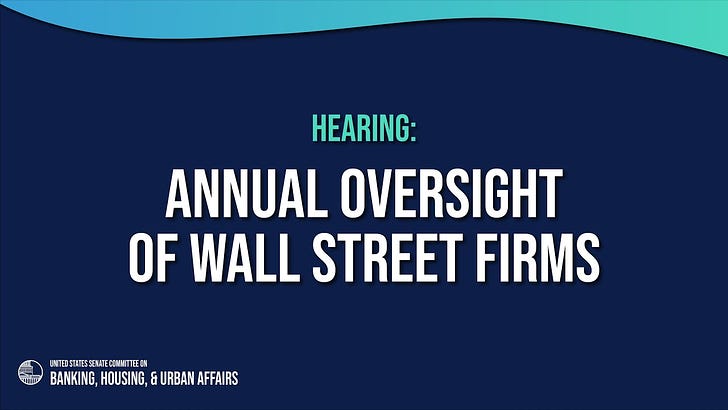While US households prepare for Christmas, US Senate Banking Hearing discusses a federal banking regulators’ proposal to raise capital requirements at banks with more than $100 billion in total consolidated assets (community banks would not be affected).
Big bankers stand fiercely against this proposal, claiming that it would hurt their capacity to lend to Main Street. A massive lobbying campaign is ongoing…
But Mr Solomon (CEO, Goldman Sachs)’s statement acknowledges quite a different issue concerning Wall Street rather than Main Street banking activities:
“we want to highlight one of the issues that is particularly punitive to capital markets activities. […] For example, it […] would increase our capital eight times for important transactions that we enter into with pension funds to improve their returns for retirees.”
Mr. David Solomon, CEO, Goldman Sachs)
Mr. Solomon’s remark points to Securities financing transactions (SFTs), which allow financial institutions to borrow securities from pension plans, giving them cash to be reinvested (and UK pension plans went distressed by such Liability-Driven investment (LDI) strategy in 2022). Accordingly, higher capital requirements may make SFTs unattractive and would therefore diminish the ability of pension plans to access that instrument and increase their returns.
Two fundamental issues remained unaddressed:
Why financial institutions such as Goldman Sachs need paying pension plans to borrow their securities? Those securities are likely being used to facilitate financial market-making and trading by the borrowing bank or by its clients which may borrow them from the bank…1
Why pension plans need to lend out their securities to generate returns? Because pension reforms made them dependent on financial investment and financial market returns.2
Yet another unaddressed issue is the Wall Street recourse to derivatives,3 which goes far beyond hedging, facilitating financial market making and trading…4
Back in 1933, the Glass-Steagall Act established federal deposit insurance for bank deposits while separating Wall Street investment banks from federally-insured deposit banks. In 1999, President Bill Clinton’s administration repealed that Act.
Congress approved landmark legislation today that opens the door for a new era on Wall Street in which commercial banks, securities houses and insurers will find it easier and cheaper to enter one another's businesses. (New York Times, Nov. 5, 1999)
Less than ten years after, the North-Atlantic Financial Crisis of 2007-08 occurred, leaving Main Street taxpayers paying for Wall Street irresponsible conduct.5
During the 2023 hearing, Chairman Sherrod Brown provided quite an alternative view on big bank capital requirements under discussion:
Your game is to try to confuse people. Most Americans probably think of a bank’s capital – if you force people to think about it at all – as money stashed away in a vault.
But that’s not what it means. Capital is just a way to fund loans and investments and risky activities in a way that can absorb losses if things go south. It means shareholders and investors are on the hook – not taxpayers.
Chairman Sherrod Brown (THE COMMITTEE ON BANKING, HOUSING, AND URBAN AFFAIRS)
Here are his financial policy conclusions:
But I think most Americans would agree that’s a fair trade-off for society: More small business lending. More first-time homebuyers. Less chance of taxpayer bank bailouts. And in exchange, maybe, smaller executive bonuses and a teeny tiny bit less profits for multi-trillion-dollar Wall Street banks.
Chairman Sherrod Brown (THE COMMITTEE ON BANKING, HOUSING, AND URBAN AFFAIRS)
Biondi, Yuri. "Ownership (Lost) and Corporate Control: An Enterprise Entity Perspective " Accounting, Economics, and Law: A Convivium, vol. 10, no. 3, 2020, pp. 20190025. https://doi.org/10.1515/ael-2019-0025
Yuri Biondi, Marion Sierra, Pension management between financialization and intergenerational solidarity: a socio-economic analysis and a comprehensive model, Socio-Economic Review, Volume 16, Issue 4, October 2018, Pages 791–822, https://doi.org/10.1093/ser/mwx015
Biondi, Yuri. "Disagreement-Based Trading and Speculation: Implications for Financial Regulation and Economic Theory" Accounting, Economics, and Law, vol. 1, no. 1, 2011. https://doi.org/10.2202/2152-2820.1017
Biondi, Yuri and Graeff, Imke J.. "Between Prudential Regulation and Shareholder Value: An Empirical Perspective on Bank Shareholder Equity (2001-2017) " Accounting, Economics, and Law: A Convivium, 2020. https://doi.org/10.1515/ael-2019-0083


